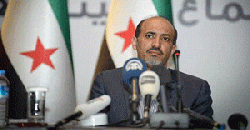DAMASCUS – Syria is set to hand over a detailed plan for destroying its chemical arsenal, the Organization for the Prohibition of Chemical Weapons (OPCW) said, as a rebel attack near Damascus triggered widespread power outages.
The plan is the next step for Damascus under the terms of a U.S.-Russian deal to head off military strikes on Syria which calls for all its chemical weapons and production facilities to be destroyed by mid-2014.
Assad’s government has already handed over an inventory of its chemicals, weapons and facilities, and a joint UN-OPCW team has been in Syria since the start of the month inspecting and destroying them.
The team has now checked 18 of 23 declared sites in Syria, destroying production equipment at almost all of them, according to Michael Luhan, a spokesman for the OPCW.
Meanwhile, Syrian authorities have freed dozens of women prisoners and cleared a prominent young blogger for release in one of the final stages of a three-way hostage deal, a monitoring group said on Thursday, Oct. 24.
President Bashar al-Assad’s government has released 64 women over the past two days as part of the Qatari and Turkish-brokered deal, the British-based Syrian Observatory for Human Rights said.
The release of 128 female detainees, held in Syrian jails, formed part of the deal brokered by Turkey, Qatar and Lebanon.
“Since Tuesday, the Syrian authorities have released 64 of the 128 prisoners due to be freed as part of the agreement,” activist Sima Nassar told AFP.
“We have received assurances that the others will be released by the end of the week,” she added.
A Syrian court also granted amnesty to Tal al-Mallohi, a blogger arrested while in her late teens more than a year before the revolt in Syria began in March 2011, the Observatory said.
Mallohi, the granddaughter of a former minister, was detained for political writing in 2009. The pro-opposition Observatory said her release was imminent.

|
| Syrian National Coalition head Ahmad Jarba showed no signs of readiness to compromise. |
The release of around 200 detained Syrian women was the main demand of kidnappers in northern Syria who had held nine Lebanese men hostage for 17 months. Those hostages and two Turkish pilots abducted in August by Lebanese gunmen in retaliation were freed last week.
Syrian authorities were working to restore power several hours after rebels attacked a gas pipeline, causing blackouts across the country and setting off a huge fire near the airport, where a key power plant is located, according to an AFP correspondent in Damascus.
On Thursday electricity minister Emad Khamis said power was being “gradually” restored to some provinces after authorities secured an alternative source of fuel for the plant, according to the official SANA news agency.
In September, a similar outage was caused after a high voltage power line was sabotaged.
Prospects dim for Geneva II
Parallel efforts by the United Nations to convene a peace conference in Geneva next month have run into resistance from the opposition, who are insisting on a raft of preconditions.
Leaders of the National Coalition – the main opposition umbrella group – insisted they will not attend unless a governmental change and Assad’s departure are on the table.
A meeting in London Tuesday, Oct. 22, between opposition leaders and diplomats from 11 members of the Friends of Syria group produced little more than a joint statement that Assad should play no future role in government.
But behind the scenes Wednesday U.S. ambassador to Syria Robert Ford, who has built up a close relationship with the opposition leaders over the past years, huddled with key figures in Istanbul seeking to coax them to the negotiating table.
“Their participation is pivotal. We will continue encouraging them to attend, and that’s why Ambassador Ford’s on the ground talking to them right now in Istanbul,” said deputy State Department spokeswoman Marie Harf.
The Syrian government retorted on Oct. 23, that no foreign party could be involved in deciding the country’s leadership.
“The Syrian people will not allow any foreign party to impose itself … in choosing a government, or in determining its powers and tasks,” the foreign ministry said.
It said the government was ready to attend the planned Geneva conference to “try its best to ensure its success without any preconditions or any foreign intervention.”
The opposition is due to meet at the start of November to finalize its position on the Geneva talks.
But Coalition head Ahmad Jarba showed no signs of readiness to compromise.
“The only thing we are willing to negotiate is a transfer of all power and then the departure of the mass killer (Assad),” he said.
Brahimi seeks cooperation from Syria’s neighbors
UN-Arab League envoy Lakhdar Brahimi insisted Wednesday, Oct. 23, that only a political solution will help end the “suffocating and dangerous” conflict in Syria, in talks with Jordan’s foreign minister.
“The Syrian crisis is suffocating and dangerous. It threatens Syria and the entire region. It is the most dangerous to stability and security” Brahimi said during the meeting with Nasser Judeh, the foreign ministry said.
“There is almost consensus that there is no military solution to the crisis and that a political solution is the only way to end the nightmare in Syria.”
Brahimi, in Jordan on a regional tour, said he seeks “greater cooperation with countries in the region to find political solution in Syria,” the statement said.
– Al-Akhbar, TAAN






Leave a Reply